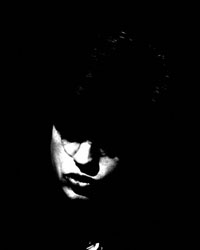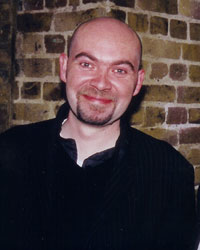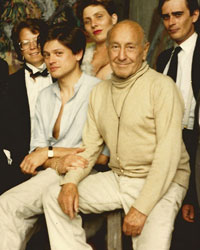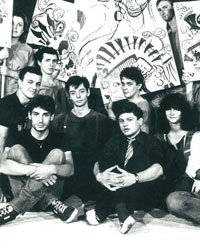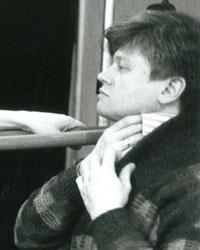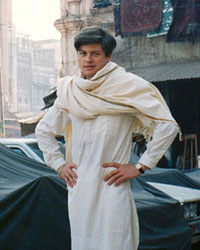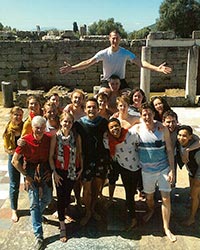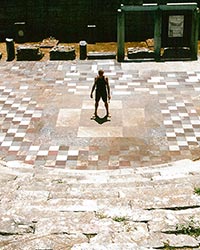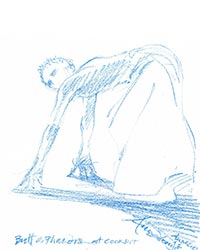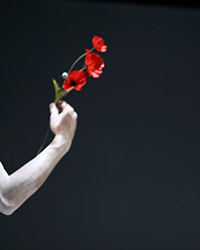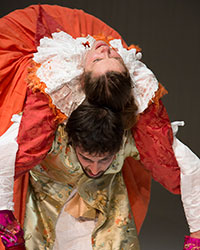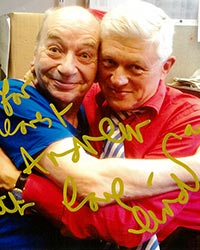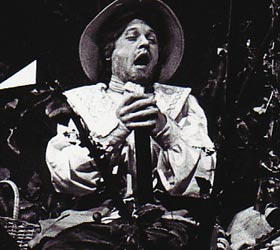My first experience of theatre, aged 3..: the Pulcinella puppet show in the Pincio Gardens of the Villa Borghese in Rome.
The 1960s and 1970s brought the excitement of seeing Laurence Olivier on stage and of the mystery of Paul Scofield and of Peter Brook’s productions, of the revelation of theatre in Poland - from Konrad Swinarski to Jerzy Grotowski, the then incomprehensible to me, iconoclastic work of Tadeusz Różewicz and the deeply affecting acting of Jacek Woszczerowicz. And in France, the work of master director Giorgio Strehler and the vibrant theatre of Patrice Chèreau.
1973-76. The Central School of Speech and Drama. In the Second Year, I was threatened with expulsion for "stylistic incompatibility". But I doggedly returned to enjoy a very fulfilling Third Year.
1976-78. My first job in theatre as actor at the Young Vic and Assistant Director to Frank Dunlop. In 1982, I was invited to return and guest direct a memorably multi-racial and controversial Romeo and Juliet. After a very short stint in a pre-West End Tour of commercial theatre, a vow never to have anything to do with it again led in 1978 to the creation of The Cherub Company (later, The Cherub Company London), initially with the intention to present rare classics and to put some spirit and personal commitment into the staging of classical plays.
For 25 years and over 36 productions, Cherub led a peripatetic life, variously based at the Young Vic, The Upstream Theatre Short Street, St. George’s Tufnell Park, The Arches in the Midland Road, in The Cut and, finally, in 2003 at the Menier Chocolate Factory.
With the backing of British Council officers Babs Todd, Nick Critchley and Paul Smith, it took its particular, visual (later called physical) style of theatre to The Netherlands, Belgium, Switzerland, Germany, Spain, Israel, Egypt, Iraq, Pakistan, Ethiopia, Sudan and Zimbabwe. Much of our success and staying power over 25 years was due to the tenacity and determination of Cherub’s Administrator, Vi Marriott.
1985-87. Following an invitation from Vim Wisser and Hans Ruhl to direct the European première of Stepping Out, these years were marked by regular work in The Netherlands, giving me the opportunity to direct Jasperina de Jongh in a musical, Kees Brusse in Pinter’s The Caretaker and to forge a lasting friendship with TV and radio icon, Hans van Willigenburg.
1988-1997. Hamlet at the National Theatre of Northern Greece resulted in 3 more productions (in Athens), the continued pleasure and challenge of working with actor Yorgos Kimoulis, an unforgettable meeting with artist and wit, Yiannis Tsaroukis at his home, with the much-loved actress Jenny Karezi in her own theatre and with the legendary Melina Merkouri at an union dispute.
In the years following my first Greek Hamlet, I enjoyed collaboration with the giant of Greek music, composer Mikis Theodorakis and with the poet-philosopher, the late Yorgos Himonas on his new translation of Macbeth, made acquaintance with actress Nonika Galinea a forged a lasting friendship with singer Margarita Zorbala.
1999-2000. I returned to Poland after 28 years to direct in Warsaw. Following the 1997 Athens Hamlet, this provided a second opportunity to work with designer Paweł Dobrzycki and composer Bolesław Rawski. The same year, I was invited to become a member of the European Academy for Science and the Arts in Salzburg.
2004-2006. I registered Theatre Alive! as a company and invited Luke Rittner, Ralph Koltaï, David Harewood and Adrian Lester to be Vice Presidents and help me steer the new organisation and to promote the work of young professionals in theatre. The flagship projects to date have been: a production of The Winter's Tale for the Mayfield Festival in association with RADA, which served as a canvas for management-skills' development for young actors, and the setting up of a new company; and a new adaptation in verse of The Oresteia Trilogy of Aeschylus written by urban performance poet, Joseph Coelho (www.theatrealive.org.uk)
2017 – The Year of Change
The years following my appointment as Associate Director of the MA in Text and Performance at RADA/King’s (and now Birkbeck) leading to the creation of the MA Theatre Lab and beyond, were challenging and inspiring, allowing daily stimulus of work with my colleagues at RADA, true teacher-practitioners, enthusiasms shared with university academics, unique friendships (Joshua Sobol, Alexander McPherson, Izumi Ashizawa, Huan Wang) as well as direct engagement with the minds, spirits and hopes of the MA students.
These RADA years have carried parallel independent adventures in theatre, too: to name but the annual workshops for the admirable Brussels Shakespeare Society; alongside Guillaume Pigé, a week of Shakespeare with young actors-in-training at the Conservatory of Villeurbanne (an opportunity to visit the house of Jacques Copeau in Pernand-Vergelesses, where the Copiaus were born - and much that is modern theatre); and a process of reigniting the kind of theatre that means something to me, with the gradual distillation of form as I moved from Journal d’un fou (with different versions seen in Paris, at the Mayfield Festival in the UK, then Greece/the National Theatre in Tirane, Albania and, finally, at Avignon), Phaedra by Yannis Ritsos, Falstaff &Son in Israel, Macbeth. A Dialogue for the 2016 Bloomsbury Festival and as a Creative Artist Programme Masterclass for the Royal Ballet School to Opium for the RADA Festival 2017.
The last two productions are the direct result of the invitation of Dr Aoife Monks, Reader in Drama Theatre & Performance Studies at Queen Mary University London, to become an Honorary Research Fellow for three years. This was the nudge needed to rethink my own practice, outside of the training of actors and theatre-makers, to take time to indulge my undiminished passion for both early modern poetic theatre (the word) and my practice in liberating the actors’ physical expression (the body) begun while creator-director of the Cherub Company 1978-2003, which lies at the core of training on the Theatre Lab course.
The fellowship has led me to explore the tension between these two in focused theatre-making terms. It's also given me the confidence to make contact with Lindsay Kemp, whose work left an indelible mark on me in the 1970s and 1980s, to bring him to RADA to work with the Lab students and observe all his classes and run a seminar with him as part of my fellowship research. This was followed by a direct approach to Jan Fabre, who also took up my invitation to introduce the Lab students at RADA to his uniquely radical approach to contemporary acting. Moreover, it has brought me into direct contact with the other fellows that Aoife brought into the circle and introduced me to areas of creativity which were totally new to me and have made me rethink approaches, endeavours, practice-as-research, as well as more recognisable theatre-making.
The creation and success of the MA Theatre Lab was the fulfilment of a dream going back to the days of Cherub, of a life-changing, horizon-expanding and skills-enriching course for the working performer who seeks exploration and change. I have been running both the courses since 2014, totting up over 20 years of contribution to the changing face of the MA Text and Performance, but it is now time for me to hand over, before fatigue or smugness set in, before the vibrant Lab vision becomes limpid and repetitive. It is once again time to embrace change. It is like falling in love again.
